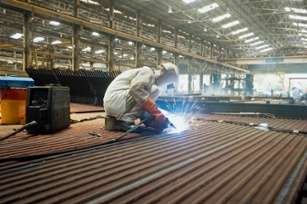
10 Rules Responsive Welding Contractors Use To Meet Your Demand: Part 3
October 14, 2016
 While accurate product forecasting is an important component of production, you can’t always foresee all circumstances. Perhaps a new market opportunity opens up, or a large customer suddenly doubles their order. You need a welding contractor partner that works with you to accommodate change.
While accurate product forecasting is an important component of production, you can’t always foresee all circumstances. Perhaps a new market opportunity opens up, or a large customer suddenly doubles their order. You need a welding contractor partner that works with you to accommodate change.
Part one and part two of this blog series explained how a fast-paced environment, qualified workers, lean manufacturing, open communication, on-time delivery, floor space, expansive equipment and a diverse range of services help your supplier meet your demand. In this last series installment, learn about the final two rules your contract supplier must follow to provide support as you work toward bold production objectives.
Having the resources to support your company’s growth is critical for your supplier. At times, your supplier may need to purchase new equipment to manufacture a certain part or assembly to your specifications. That’s why welding contractors should maintain a flexible budget.
Your supplier’s client base also may grow significantly. To keep production lines running, it should invest in new employees. When your supplier has the ability to pay for an appropriately sized workforce, your order fulfillment is rarely delayed, supporting streamlined production at your own facility. You can usually determine the size of your supplier’s workforce by visiting its facility.
9. Build An Infrastructure That Supports Change
Managing change is a complex undertaking, but responsive welding contractors should be experts in this area. Your supplier will have to adjust its implementation plans if part designs are revised or it receives new manufacturing process instructions.
Metal manufacturers must assess how changes impact their day-to-day operations and take proactive steps to ensure fluidity. When you work with a supplier that doesn’t have the infrastructure to support change, the following consequences may occur:
You receive too many of the wrong parts and must maintain an unneeded inventory.
You must manage a deficiency of the right parts, paying for rush shipping charges.
Defective parts and assemblies reach your customers.
10. Ensure High-Quality Parts And Minimal Defects
When you receive metal parts that don’t meet your quality standards, your production line slows down while you send the parts back and wait for new ones to arrive. This may cause you to miss sales opportunities, impeding your OEM’s growth.
Your supplier should meet your capacity needs without sacrificing product quality. Throughout each metal manufacturing process, quality control measures, such as detailed inspections, should be in place. With minimal defects reaching your facility, you can optimize your own production for greater throughput, fueling your sales.
Metal manufacturing companies must take a proactive approach to meeting your capacity and growth demands. Without strategizing for the future and preparing for potential obstacles that may block your path to success, you and your supplier will be stuck in a reactionary spiral. In other words, you’ll be continuously unprepared for the challenges that come your way and one step behind the competition.
A responsive welding contractor combines foresight with flexibility. Few obstacles come as a surprise, but your supplier is ready to spring into action with a well-timed solution when an unexpected issue does arise. Working together, you and your supplier can handle ever-increasing demand and grow your business to its full potential.
Ready to learn more about partnering with Miller? Contact us today!